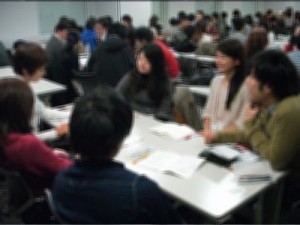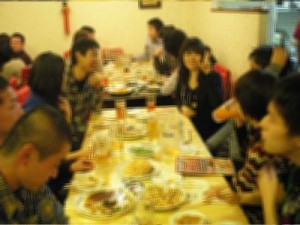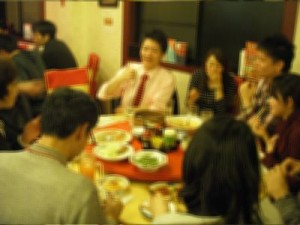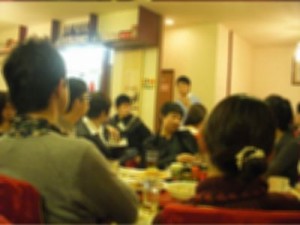第50回 WORKSHOP報告(12月15日) / 参加者83名
みなさんこんにちは。
12月15日(土)に行われた第50回workshopの開催報告をさせていただきます。

(1:前半マテリアル担当者の方にご挨拶いただいています)

(2:プレゼン準備にみなさん真剣です)

(3:こちらのグループは笑顔もでて余裕がありますね)

(4:中華料理店での忘年会が始まりました!)

(5:やっぱり中華は円卓!)

(6:新スタッフの方々からご挨拶いただきました)
:::::::::::::::::::::::::::::::::::::::::::::::::::::::::::::::::::::::::::::::
《 今回のworkshop 》
○workshop参加人数:83名(うち新人の方:7名)
○【前半】:「嫉妬の解決方法」に関するディスカッション
○【後半】:「Entrepreneurship」をテーマとしたディスカッション
この日はE’s clubが2010年の9月に第1回目のworkshopを行ってから数えて、
記念すべき50回目のworkshopとなりました。
立ち上げ当初は30人前後で開催されていたworkshopも、
このところ80人を超えることが多く、
10/7の第47回では100人を超える方々にご参加いただきました。
メンバー同士の交流も、workshopだけではなく、
合宿や懇親会などいろいろな形で大変盛り上がっています。
これもひとえにご参加いただいているメンバーの皆様のご協力のおかげです。
心より御礼申し上げます。
今回の後半のマテリアルは、
今年からご参加いただいている台湾御出身のSさんに作成していただきました。
最近は、外国籍の方々からのアクセスも複数いただいています。
今後はさらに国際色豊かなworkshopになると、
いろんな角度からの意見交換ができて、議論も活発になりますね。
またこの日、71名の方々にご参加いただき、
忘年会を開催いたしました。WORKSHOP会場近くの
中華料理店で、3,000円飲み食べ放題というオトクな
忘年会でした。当日キャンセルを見込んで54名で
最終人数をお店に報告したのですが、
新人の方々や、当日に参加を決められた方も
おられ、17名の増員となり、会場はクーラーを
使用したくなるほどの温度となりました。
新たに幹事・スタッフにご就任いただいたメンバーや
今回ご退任いただくスタッフからのご挨拶もあり、
酔いがいい具合にまわったメンバー?からの掛け声
で、とても盛り上がっていました。
年明けはまた新年会も予定しておりますので
今回忘年会にご参加いただけなかった方も
どうぞご参加くださいね。
それでは今回のworkshopの案内メールをご覧ください。
:::::::::::::::::::::::::::::::::::::::::::::::::::::::::::::::::::::::::::::::::
<英語サークル E’s club 第50回workshopのご案内>
みなさまこんばんは、E’s club幹事のKです。第50回workshopの詳細をお送りいたします。
2010年9月4日に第1回workshopを開催してから2年3ヶ月。
E’s clubのworkshopもついに第50回を迎えることとなりました。
これもひとえにメンバーのみなさまにサークルをご支援いただいているおかげです。
改めてお礼を申しあげます。みなさまいつもご参加いただきありがとうございます。
今回は前半のマテリアルをKさん、後半のマテリアルを台湾ご出身のSさんに作成していただきました。
前半は「嫉妬の解決方法」、後半は「Entrepreneurship」をテーマとしたディスカッションを行ないます。
[今週のマテリアル]
<FIRST HALF>
皆さんは嫉妬を感じるときはありますか?僕はあります・・・時々は仕事で、時々はプライベートで。
嫉妬ってイヤですよね?気持ちが全然スッキリしません。嫉妬を感じることなく、クリスマスとお正月を過ごしたいものです。
そこで、嫉妬を克服するコツを書いた記事を見つけたので紹介します。
これは主に恋愛用ですが、職場などの人間関係においても充分に活用できると思います。皆さんの参考になればと願っています。
まずこの記事を読んで、役に立つ、大切だ、印象に残ったなど自分の1位から4位までを決めてください。
そしてグループ内で皆の順位と比較し、なぜ自分がこの4つを選び、その順位にしたのかを説明してください。
他人の意見の中に、自分では気が付かなかったコツが見つかるかもしれません。また、できれば経験談も交えてください。
冷静に話せれば、それはすでにコツをつかんでいるかもしれません。
次に、嫉妬に悩み苦しむ事例Aの彼と事例Bの彼女にアドバイスをお願いします。グループ内で意見をまとめ、発表もお願いします。
1 Compare your rankings.
(1) After reading this article,please rank tips from 1st to 4th in order that you think it is useful,important,or impressive.
(2) Please compare your ranking with your group members’ and explain why you choose and rank these 4 tips, including your experience if possible.
2 Give Atsushi and Aoi some advice! (Make short presentation.)
Case A
Atsushi loves Hiroko very much, they go out on a date twice in a month.
Hiroko likes drinking, and often goes to drinking party.
She goes for a drink or drive with other men sometimes. (She said to Atsushi, ’They are just friends.’)
Atsushi wonders how much she loves him.
He feels jealousy and struggles with it.
Case B
Aoi loves Key very much, they go together for 3 years.
Key is tall, kind, and cool.
He is also kind to other women, and talks happily with them sometimes.
Aoi wants to get married to him, but she is anxious about his love affair.
She feels jealousy and worries about him.
10 Ways to Beat Back Blinding Jealousy
Jealousy. We all feel it. It’s human. Sometimes, it’s when we see a friend who has the brand new car we’ve been itching for. Sometimes it’s when someone we love has the life we want for ourselves. Whenever the green-eyed monster comes out to play, it strikes us all at one time or another.
What happens when jealousy takes over a relationship? What do we do when we can’t help but feel jealous about things our partner does?
Here are some tips for overcoming jealousy in a romantic relationship — before it eats you alive.
1) Pinpoint the reasons for your jealousy: is it based on a past event? Has your partner lied to you? Once you have a reason, you can begin to work on the solution. Awareness of the reasons for your jealousy is important.
2) Identify what role your insecurities are playing in this — is this based on a previous relationship? Has your partner REALLY done anything wrong? Is this a problem with low self-esteem?
3) Tell your partner about your jealousy using “I feel” statements. Feelings aren’t up for debate, and an open line of communication — WITHOUT being accusatory — is key here. It could be as simple as, “I feel jealous when you spend so much time with your friends.”
4) If your jealousy is stemming from something to do with a past relationship, remind yourself that you’re in the present. You are no longer in that relationship, this is a new partner, and as such he or she should be given a chance.
5) Really let yourself feel the jealousy. Don’t tell yourself you shouldn’t or should “be over it” (that’s one of the quickest ways to guilt). Become hyper aware of the reasons for the envy. Facing it head-on will cause jealousy to lose some of its power.
6) Remind yourself that you are worthy of love and that you love yourself. Focus on being the best you can be — it’ll help attract the right partners as well as allow you to completely commit to a relationship.
7) Write it out. Doesn’t matter if you think it’s stupid — the act of writing something down (especially when it’s negative) forces you to organize your thoughts. Try a word cloud, if writing is too much.
8) Before going off on your partner, sit with your jealousy and ask yourself: is this someone/thing worthy of my energy? What would this person/situation really do to me? Why do I feel threatened?
9) When you feel the jealousy really take hold of you, change what it is you’re doing. Get up, go for a walk. Load the dishwasher. Change your thought patterns by doing something else. Then you can look at the situation more objectively.
10) If you simply cannot get past the jealousy, try going to a therapist who can help you sort out your feelings. Finding an objective third party is ALWAYS a good thing to have! That way, you can develop more positive ways of coping with the green-eyed monster.
Have you been jealous before? How have you overcome it?
<LATTER HALF>
Entrepreneurship and Social Responsibility
Hello everyone,
This is S, born in Taiwan, my great honor to be here with you to have the last workshop in 2012. So today i want to discuss Entrepreneurship and Social Responsibility with you.
Never thought i could be falling in love with Japan so much before i came here in Oct 2010, friendliest people,
fascinating culture, especially the culture about cherishing, advanced technology, and of course, unparalleled food, which, I guess, is also an extremely important reason for most of the foreigners out there.
Meantime, however, Japan, although with its countless advantages, like always ranked among the world’s most innovative countries leading several measures of global patent filings, is also facing various problems comparing to the other countries in southeast Asia, like aging, bureaucracy, closed and domestic……so by talking about this, it would be great if you can share your ideas that if Entrepreneurship could possibly solve the problems mentioned, even just partially. Let’s start the discussion from the steps as below.
・What is Entrepreneurship? Please share your own opinions about Entrepreneurship before you check the related reference.
・It’s said that Entrepreneurial Spirit is weak in Japan due to various social and cultural reasons, could you specify this?
・If you were Mr. Yusuke Takahashi (please read the reference), would you make the same decision? Why?
・Do you think Entrepreneurship is essential to Japan? Why? By talking about Entrepreneurship, what is the connection with social responsibility?
・If it’s possible, what types of feasible activities would you like to have in E’s club to encourage and cultivate entrepreneurship? If any of you guys have been already doing this or just have the intentions without a specific plan, it will be highly appreciated if you can share that with us. (please make a collection of the suggestions about the activities, thank you)
Even Japan right now is still in a sharp recession, I still think Japan is a hopeful continent, because people like you are willing and trying to make some changes to yourselves and this society, E’S club itself is also one of the most exciting and impressive evidences that i have been witnessed after i came to Osaka, Most of you here, as i know, are well educated, ambitious, the reason why you join E’s, i consider, is not only just for improving your English but also trying to make some difference to yourselves, then why not stepping forward to have some actions to make this society more different and hopeful. Thank you.
Cheers, Steve
2012/11/30
Reference
Japan: Entrepreneurs spur out-of-the-box thinking
(BBC Business News, By Nastaran Tavakoli-Far, http://www.bbc.co.uk/news/business-19893561)
A week after getting married, Yusuke Takahashi had an alarming surprise for his wife’s family. He dropped his prestigious and stable job as a university professor and struck out on his own as an entrepreneur.
A few weeks after, finding it hard to get feedback on his ideas within Japan, Mr Takahashi decided he had to go to San Francisco to validate them. He spent two months sleeping on various couches while he talked to more than 200 people, from chief executives to those at the same stage as himself.
Mr Takahashi read Steve Blank’s The Four Steps to the Epiphany, translated into Japanese as The Textbook for Entrepreneurs, on the nine-hour flight from Tokyo, having randomly found it on his iPad.
“I read the book twice on the airplane,” he says, “and I found out where I’m at right now and what I should do when I land.”
Mr. Takahashi is one of a growing number of Japanese shunning prestigious employments in large firms in favor of doing their own thing.
“To make your own kingdom is not a bad thing,” agrees Shotaro Tsuda.
He shares a space with Mr. Takahashi at Open Network Labs, an “accelerator” based in Tokyo which was set up in 2010 with the aims of fostering an ecosystem for entrepreneurs. The “accelerator” chooses around half a dozen start-ups to spend three months at the lab developing their ideas.
“One of my dreams was to do my start-up,” Mr. Tsuda says of his drive to be an entrepreneur in what is a risk-averse society with a legacy of having a job for life.
But ultimately it is the economy, rather than personal ambitions, that is making this decision for Japan’s growing number of entrepreneurs. Big companies aren’t doing as well and are hiring fewer young graduates.
“There are like 40,000 fresh graduate students who don’t have work,” Mr. Tsuda says. “So some people try to set up their own companies because they have to survive”.
It is a reason often heard by Hiro Maeda, one of the founders of Open Network Labs.
It is not just young graduates who are turning to their own enterprises, but Mr. Maeda sees many applications from people in their 30s and older who have worked in established companies.
“A lot of the established players are no longer so established,” he says, explaining that companies like Panasonic and Sony hit their all-time lowest share prices this year and have been laying off workers.
“It’s because there’s that uncertainty that people are willing to leave their jobs and take higher risks.”
Less competitive
Japan suffered a sharp recession in the wake of the 2008 global financial crisis, as exports fell, hitting some of the country’s most prestigious and successful companies.
At the same time, the costs of starting a company, in particular for those operating in the technology industry, have fallen dramatically, and increasingly innovation is happening in this space.
Japanese-American entrepreneur, venture capitalist and MIT Media Lab director Joi Ito, who is also a founding member of Open Network Labs, believes that entrepreneurship is essential if the country is to regain its competitive edge.
“As the world gets more agile and as innovation gets pushed to the edges, into small groups of people, many of them not even part of larger organizations, that’s where innovation is happening,” Mr. Ito says.
“You need an entrepreneurial spirit to turn those ideas into companies or even to take the risk to try those ideas in the first place,” he says.
Wider changes
While the model of a life for job has become less of a possibility with Japan’s current economic situation, other changes are also making entrepreneurship more attractive and feasible.
Prof Kenji Kushida of Stanford University’s Walter H Shorestein Asia-Pacific Research Center notes that traditionally the entire structure of Japan’s economy and society has made things difficult for entrepreneurs.
“Entrepreneurs are people that are non-conformist,” he says. “It’s difficult for non-conformists in the way that the whole system is set up, but things are moving in the right direction.”
Banks now lend more easily, whereas previously personal assets were required as collateral, meaning that failure of the firm would lead to personal bankruptcy.
There is also money available from venture capital funds and “angel” investors.
There are also wider social changes at play. The country’s much discussed fear of failure is slowly fading, a fact confirmed by Mr Tsuda’s openness to talk about his first start-up, which was unsuccessful.
Mr Tsuda laughs heartily about this experience. “My mother was utterly disappointed,” he says, “and a little worried about me.”
The fallout of the earthquake
The earthquake of 2011 was the most powerful to have hit Japan, resulting in more than 15,000 deaths and affecting several industries.
Furthermore, the earthquake and resulting tsunami affected several nuclear power plants, resulting in a nuclear scare after radiation levels rose in the surrounding areas.
Joi Ito sees profound changes taking place in the country as a result of this natural disaster, citing protests regarding the nuclear power situation as an example.
“The Japanese seem to have more civic energy than ever before,” he says.
Lisa Katayama has close experience of this.
The Tokyo raised journalist founded the Tofu Project, which connects entrepreneurs, innovators and business leaders in Japan and the US through a series of events.
She has seen more interest in entrepreneurship and from a wider range of people. Ms Katayama sees the fallout of the earthquake as being a key catalyst to this process.
“It comes from survival, and needing to survive,” she says.
Her documentary We Are All Radioactive follows a community of surfers rebuilding a coastal town in the aftermath of the earthquake. She has been in close touch with people in the northern coastal regions of the country and seen people starting their own ventures.
One example is the farmer Ishimori, who appears in the documentary measuring radiation levels.
“He bought a radiation detection machine and is single-handedly trying to help other farmers see whether their crops are radiated, it’s very entrepreneurial,” Ms Katayama says.
The Tofu Project aims to put him in touch with the right people and resources during their next event in October.
“Japanese people have always traditionally really trusted the government to take care of them,” Ms Katayama says, “or they’ve worked in an industry that’s been sustainable and fine, like farming or fishing.”
“Now they can’t do that anymore because of the earthquake. I think it’s forcing people to think outside of the box.”
—-END
**********************************************
私たちと一緒に英語コミュニケーション能力を鍛えませんか?
ご興味を持たれた方は、
入会申込フォーム
https://english-speaking-club.com/cms/?page_id=93
よりお申し込みください。お待ちしています!
***********************************************************